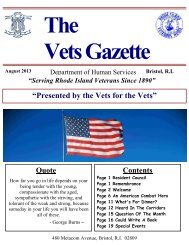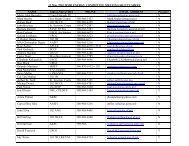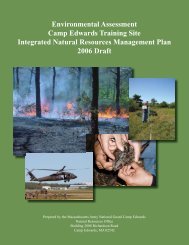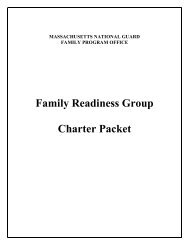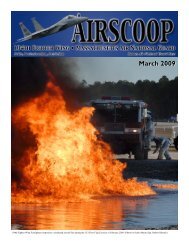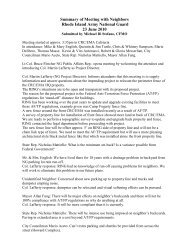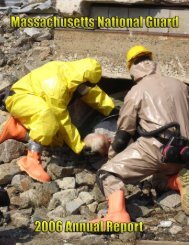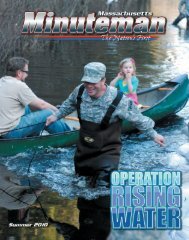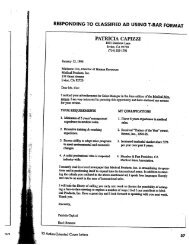Appendix K - Tungsten Information - STATES
Appendix K - Tungsten Information - STATES
Appendix K - Tungsten Information - STATES
Create successful ePaper yourself
Turn your PDF publications into a flip-book with our unique Google optimized e-Paper software.
Page 2<br />
--<br />
ToxFAQs1\1 Internet address is http://www.atsdr.cdc.gov/toxfaq.html<br />
o <strong>Tungsten</strong> metal and metal alloys occur in consumer products<br />
such as electronics, light bulb filaments, cemented tungsten<br />
carbide grinding wheels and carbide tipped tools. They are also<br />
present in "green bullets" that are made without lead.<br />
How can tungsten affect my health?<br />
<strong>Tungsten</strong> compounds have caused breathing problems and<br />
changed behavior in some animals given large amounts of<br />
tungsten compounds. However, you are not likely to be<br />
exposed to amounts of tungsten in the air you breathe or the<br />
food or water you take into your body that would be large<br />
enough to cause similar effects.<br />
How likely is tungsten to cause cancer?<br />
There is not enough information to determine whether<br />
inhalation, oral, or dermal exposure to tungsten or tungsten<br />
compounds can cause cancer in humans. <strong>Tungsten</strong> has not<br />
been classified for carcinogenic effects by the Department of<br />
Health and Human Services (DHHS), the International<br />
Agency for Research on Cancer (IARC), or the EPA.<br />
<strong>Tungsten</strong> has been recommended to the National Toxicology<br />
Program (NTP) for testing in laboratory animals, which<br />
includes a cancer assessment.<br />
How can tungsten affect children?<br />
Children may be affected in the same way as adults. We do<br />
not know whether children differ from adults in their<br />
susceptibility to tungsten. Animal studies have shown that<br />
tungsten can pass from the maternal blood through the<br />
placenta and reach the fetus.<br />
How can families reduce the risks of exposure to<br />
tungsten?<br />
o It is very unlikely that tungsten is present in the average<br />
home or apartment at unsafe levels.<br />
o Use bottled water if you have concerns about the<br />
presence of tungsten in your tap water.<br />
TUNGSTEN<br />
CAS # 7440-33-7<br />
o If you get tungsten dust on your clothes, shower and<br />
change your clothes before leaving your job and returning<br />
home.<br />
Is there a medical test to determine whether I've<br />
been exposed to tungsten?<br />
Tests are available to measure tungsten in your blood, urine,<br />
hair, saliva, and feces. These tests are not usually done in<br />
the doctor's office because they require special equipment.<br />
Elevated levels of tungsten in the feces can mean high<br />
recent tungsten exposure. Elevated levels of tungsten in the<br />
urine and/or blood can mean high tungsten consumption<br />
and/or high exposure. The average urine concentration for<br />
the U.S. population was 0.083 ~g/L in 2003.<br />
Has the federal government made<br />
recommendations to protect human health?<br />
For tungsten and insoluble tungsten compounds in air, the<br />
National Institute for Occupational Safety and Health<br />
(NIOSH) recommends an exposure limit of5 mg/m3 (average<br />
over a to-hour period) and a short-term (15 minutes)<br />
exposure limit of 10 mg/m3. The Occupational Safety and<br />
Health Administration (OSHA) set limits for tungsten of<br />
5 mglm3 (insoluble compounds) and I mg/m3 (soluble<br />
compounds) for construction and shipyard industries.<br />
References<br />
Agency for Toxic Substances and Disease Registry<br />
(ATSDR). 2005. Toxicological Profile for <strong>Tungsten</strong> Atlanta,<br />
GA: U.S. Department of Health and Human Services, Public<br />
Health Service.<br />
Where can I get more information? For more information, contact the Agency for Toxic Substances and<br />
Disease Registry, Division ofToxicology, 1600 Clifton Road NE, Mailstop F-32, Atlanta, GA 30333. Phone: 1-888-422-<br />
8737, FAX: 770-488-4178. ToxFAQs Internet address via WWW is http://www.atsdr.cdc.gov/toxfaq.html. ATSDR can<br />
tell you where to find occupational and environmental health clinics. Their specialists can recognize, evaluate, and<br />
treat illnesses resulting from exposure to hazardous substances. You can also contact your community or state health<br />
or environmental quality department if you have any more questions or concerns.



